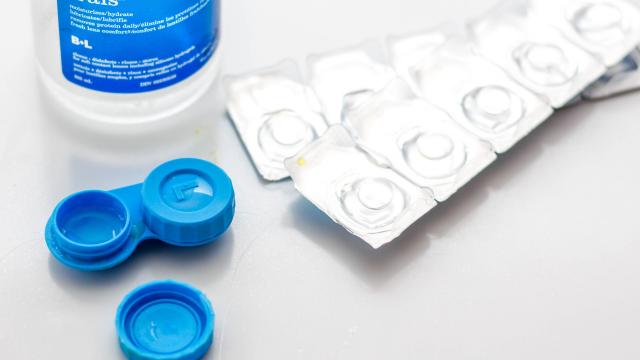I wear my contact lenses most days. At the end of every month, my two flexible lenses’ lives are over. Into the bathroom garbage bin, they go.
Turns out that one in five users of contacts may be flushing them down the drain or toilet—an ungodly act that exacerbates our plastic pollution problem. That’s according to a not-yet peer-reviewed paper led by researchers from Arizona State University’s Biodesign Institute’s Center for Environmental Health Engineering. They presented their research at an American Chemical Society meeting Sunday.
Those of the roughly 45 million U.S. contact wearers who throw their lenses down the drain are causing additional plastic to wind up in our sewage system and reach wastewater treatment plants. There, contacts eventually meet their fate as part of the sewage sludge these plants produce. The study authors estimated how many contact lenses end up in our waste by conducting an online survey of about 400 users to figure out what proportion throw them down the drain. They also tested how bacteria found in treatment plants interact with 11 lens polymer types and found that none are particularly biodegradable.
The paper’s abstract, which is all that’s publicly available until the study is accepted into an academic journal, estimates that more than 10,886kg of the polymers found in contact lenses end up on U.S. land a year as “biosolids,” or processed sludge, through some form of application like farm fertiliser.
“We’re hoping people will stop flushing their lenses and that that number goes down,” said Rolf Halden, the director of the Center for Environmental Health Engineering who co-authored the paper, to Earther.
The research team worries about these plastics eventually making their way into the food chain through our land-based friends (like worms and birds) and/or our aquatic buds (like mussels and fish). That’s potentially bad news for humans, too, as research has shown that plastics can absorb pollutants (like mercury) in the water, causing them to accumulate in fish, which may eventually make their way into our bodies when we eat them.
The impact on human health remains to be seen, but this latest research is another warning to humanity to slow down its plastic consumption.
Still, plastics aren’t all we should be worried about, said Allen Burton, an environmental sciences professor at the University of Michigan who oversees the Environmental Toxicology and Chemistry academic journal, which examines similar research topics. The way he sees it, people also need to be worrying about the threats from excess nutrients and urban runoff, which he sees as a bigger main cause of problems in our aquatic systems.
“In general, yes we need to get rid of plastics,” Burton told Earther. “They are causing huge problems.”
However, he doesn’t want this research to spur the sort of backlash we’ve seen against, say, plastic straws to the points where they’re banned or severely restricted. “Don’t tell me that I need to get rid of my contact lenses,” he said. “They’re not causing a huge problem .”
Of course, Halden and his team aren’t calling for such, but they do hope users quit flushing these plastic lenses down their drains. Microplastics expert Susanne Brander, an assistant professor at Oregon State University, is grateful for these findings. She told Earther she wasn’t surprised by them, but she thinks the public needs as much research on plastics as it can get.
“This study is timely in that it points out that we’ve only scratched the surface when it comes to eliminating [microplastics],” Brander said.
